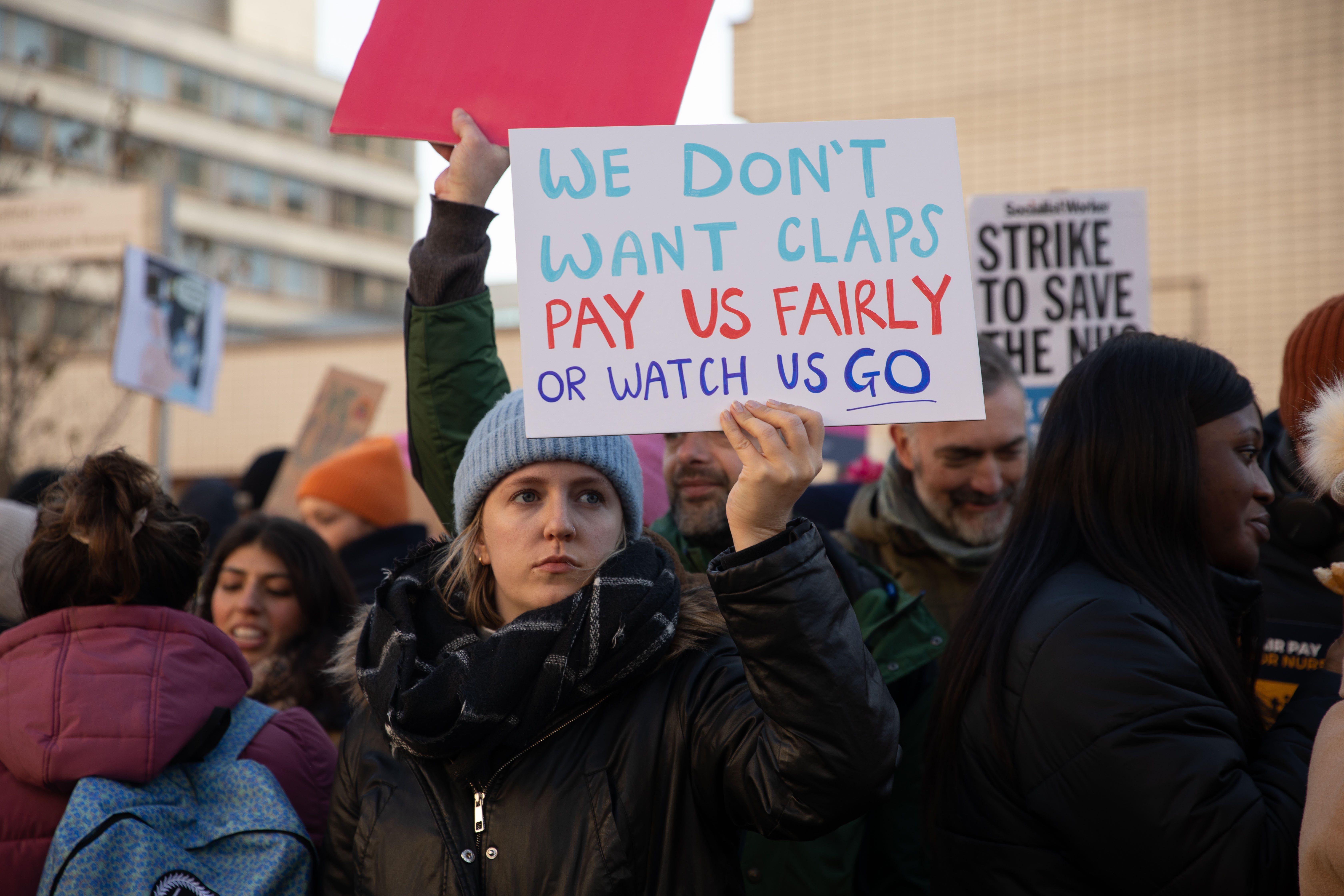Sunak ‘really disappointed’ by NHS strikes in run-up to Christmas
Prime Minister Rishi Sunak urged unions to consider whether the action was ‘really necessary’.

Rishi Sunak pleaded with unions to call off NHS strike action with a warning about the impact the walkouts will have on people’s health.
Nurses in England, Wales and Northern Ireland will walk out again on Tuesday, while ambulance workers will strike on Wednesday in England and Wales.
The Prime Minister insisted the Government was “happy to sit down and talk” with unions but ministers have so far refused to discuss pay, one of the major factors behind the disputes.
“I’m really disappointed to see that the unions are calling these strikes, particularly at Christmas, particularly when it has such an impact on people’s day-to-day lives with the disruption it causes and the impact on their health,” Mr Sunak said.
“I would urge them to keep considering whether these strikes are really necessary and do everything they can to alleviate the impact it’s going to have on people.
“The Government, for its part, is being responsible in putting in place contingency measures to make sure we are well prepared to handle the disruption that is coming.”
A meeting of the Cobra contingencies committee took place on Monday morning, with another planned for Wednesday as ministers consider how to cope with the wave of industrial action affecting not just the NHS but the rail network and other public services.
Mr Sunak held firm on the issue of pay, insisting his focus was on tackling inflation.
“Part of us doing that is having a responsible and fair approach to pay,” he told reporters during a visit to Riga, Latvia.
Downing Street denied reports that it had blocked Health Secretary Steve Barclay from offering a one-off payment to nurses.
Saffron Cordery, interim chief executive of NHS Providers, urged the Government and unions to come to an agreement on pay as she warned of the impact on patients.
The Royal College of Nursing (RCN) warned that the union did not want protracted strikes but its mandate covered the next six months.
Ahead of Tuesday’s second day of strike action, Ms Cordery told BBC Breakfast NHS trust leaders “genuinely understand why staff are choosing to strike, so I think they would urge the Government and the unions to get round the table and discuss pay”.
She said 999 calls “that affect life and limb” will be answered” but “it’s worth remembering that this is going to be an incredibly challenging and disrupted week, not only because we have the ambulance service coming out on strike across nearly every region, but also because we’ve got these sequential strikes”.
Ms Cordery said negotiations are continuing nationally and locally between unions and ambulance services to work out which incidents should be exempt from strike action.
All category 1 calls – the most life-threatening such as cardiac arrest- will be responded to, while some ambulance trusts have agreed exemptions with unions for specific incidents within category 2 which covers serious conditions, such as stroke or chest pain.
Military personnel are expected to be drafted in to cover for striking ambulance workers during the dispute.
Mr Barclay used a visit to a hospital in London to call on ambulance unions to ensure patients are kept safe.
“If, for example, they only allow staff to respond from the picket line that will add further delay to the response times, which is not in the patient’s interest,” he said.
Unison general secretary Christina McAnea said ambulance staff are taking action because ministers refuse to negotiate with them on pay.
Ms McAnea told BBC Radio 4’s Today programme: “The Government has been completely intransigent here.”
Patricia Marquis, director for RCN England, told Times Radio that nurses could stage strikes for up to six months.
The RCN has highlighted the 47,000 nursing vacancies in the NHS and Ms Marquis said operations were being cancelled and people are waiting in ambulances “every single day” within the NHS.
If we can avoid the strikes even tomorrow, we will. But the only way to do that is by having a conversation about what this is about, which is pay and safe staffing
She added: “All of our members and all of us want to find a resolution. If we can avoid the strikes even tomorrow, we will. But the only way to do that is by having a conversation about what this is about, which is pay and safe staffing.”
Data collected by the NHS after last week’s nursing strike showed that 16,000 appointments, procedures and surgeries were cancelled and needed to be rescheduled in England – 54,000 less than the Government suggested.
Across England, 9,999 staff were absent from work due to the strike.
The figures were published after health minister Maria Caulfield said around 70,000 appointments in England would be lost.
The RCN, which is calling for a 5% above-inflation pay rise, has vowed to stage a fresh wave of more severe strikes in January if ministers do not open talks.
But Mr Barclay said the union should respect the independence of the NHS pay review body, which has set pay for nurses at about £1,400 more a year, at least a 4% rise.
During his visit to King’s College University Hospital, Mr Barclay was rebuked by Sarah Pinnington-Auld, the mother of a three-year-old patient with cystic fibrosis, over NHS staff working conditions.
Alongside the NHS disputes, Border Force staff are preparing to walk out for eight days from December 23 until New Year’s Eve, while rail workers are preparing to strike again on Christmas Eve.
Bookmark popover
Removed from bookmarks